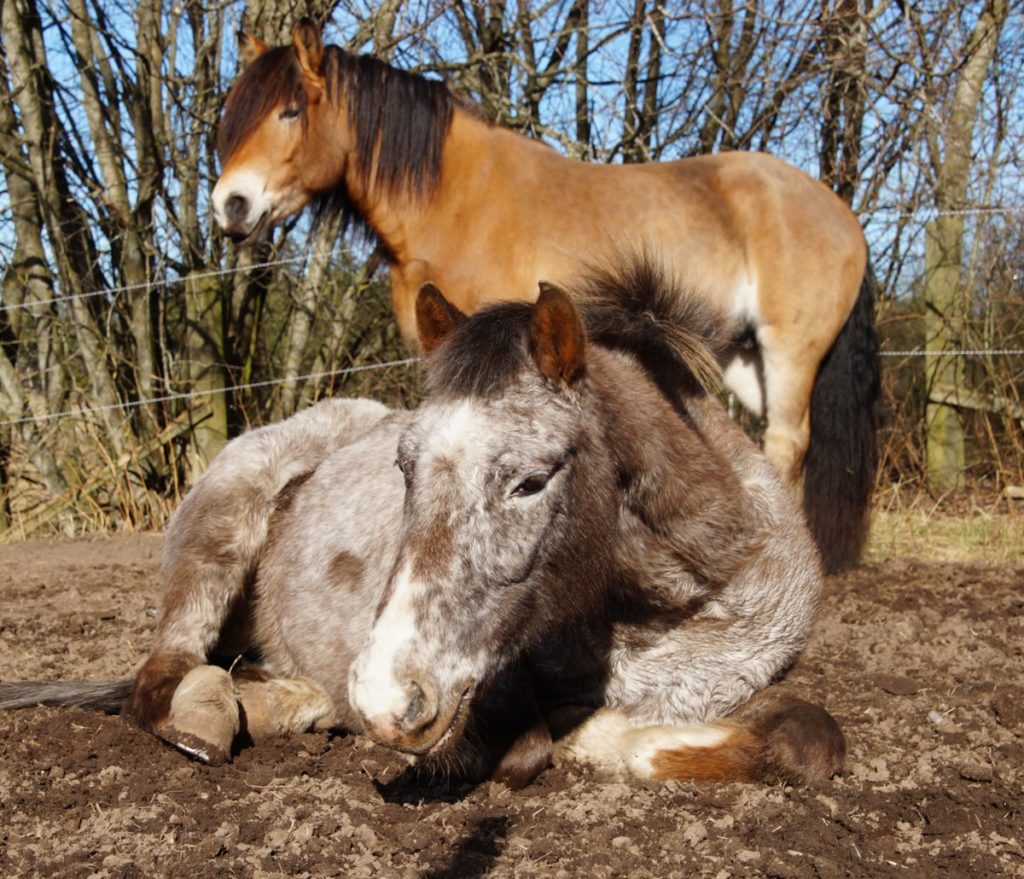As a horse gets older, you may notice them resting more often. Much like humans, senior horses enjoy some good shut-eye more often than their younger counterparts.
Older horses tend to sleep more than adult horses. While an adult horse requires 3-5 hours of sleep, a senior horse may be seen sleeping closer to 6. The way they sleep is different too. Senior horse sleep patterns differ from those of younger horses.
While you may catch a horse snoring in the pasture, you might be surprised as to how alert he or she may be. Horses don’t sleep as humans do. But depending on age, a horse might need more restful sleep to keep them mentally sharp.

Do Old Horses Have Different Sleep Patterns?
We tend to see sleeping as a big 8-hour lights-out event, but for a horse lying down is just part of a four-phase sleep cycle.
Just like us, horses require different types of rest. Being prey animals, their brains need to be more active while resting to keep them safe. Constantly being on alert can mean the difference between life and death.
As a horse gets older, though, they tend to spend more time in the resting phase. This type of sleep is called paradoxical sleep. For horses, this time is spent lying down, allowing the body to relax and the brain to enter REM(Rapid Eye Movement) sleep. This is when the horse finally gets to rest all its muscles, becoming paralyzed.
When the brain enters Paradoxical Sleep, it is just as active as when awake, hence the name. Humans also enter this type of sleep.
While the science of sleep is still somewhat a mystery, researchers believe animals enter this type of sleep to do maintenance on the brain and process the memories of the day. Old horses may require more of this time because, just like us, their aging minds just don’t perform as they used too.
You may see old horses lying down more than adults, but younger horses also sleep more. Young foals can spend almost half the day snoozing!
What are Normal Sleep Patterns for a Horse?
Horses are grazing prey animals. They are prime targets for hungry predators. That means they need to be on alert to survive. This has had a profound effect on their sleep patterns.
Horses have four different phases of sleep:
- Diffuse Drowsiness
- Intermediary
- Slow-Wave
- Paradoxical

Most of these sleep types allow for the horse to rely on its senses to protect it from predators.
Most of the sleep a horse gets is in the first phase: Diffuse Drowsiness. This occurs when the horse is still standing up, often shifting its weight to allow for one leg to rest at a time. When a horse is in this phase, it usually has its face towards the ground, simulating grazing. The first phase is when the horse is most alert.
When a horse starts to get more comfortable and feels safe, it will move to the next phase. Here we see the animal entering the Intermediary phase. It still is alert enough to notice any predators. This phase is the transition point to Slow-Wave.
Slow-Wave sleep is the deepest of the non-REM sleep cycles.
You can tell a horse is in these phases because they will be lying flat on their chest, legs tucked in, and head slightly raised. In the event they notice trouble, they can still spring up quickly and get away.
To enter the REM cycle of sleep, a horse must feel comfortable enough in its surroundings to let its guard down. This heavy sleep usually happens in the evening or at night. Often when the night is darkest, and the horse is safest, does this paradoxical sleep occur.
If the conditions are right, a horse will then enter Paradoxical sleep. Here its body will go paralyzed, leaving it the most vulnerable.
What factors affect a Horse’s Sleep?
Horses need to feel safe in their environment to get sound sleep. This is a huge factor when it comes to what kind of rest a horse can get. Other problems can affect a horse’s sleep too.
Here are some things that might affect a horse’s ability to sleep:
- Pain or Illness
- Dominance Issues
- Lack of a companion
Much like humans, horses feel more comfortable when they can lie down somewhere nice and soft. A horse lying comfortably in a pasture will get significantly more sleep than a horse lying on a rubber mat in a stable.
Pain or discomfort in a horse’s joints may prevent them from lying down. Here is another factor in older horses that prevents the paradoxical sleep cycle. When horses can’t lay down, they sometimes enter their REM sleep cycle while standing. This causes them to collapse over!
A horse also needs other horses nearby they can trust. When a horse feels uncomfortable with the horse next to them, they are constantly wary and often lose sleep. Companionship is another survival trait that has kept horses safe from predators.
Another factor is dominance. When herd structure has not been established, there is no alpha-horse. More often than not, this causes confusion. This happens when a herd has a lot of young geldings. These are castrated horses. The lack of a dominant leader will cause the horses to constantly be on edge, preventing meaningful sleep.
How long do Horses sleep?
Horses don’t need as much sleep like other animals. The less a horse has to sleep, the safer it is. Evolutionarily, the horses that slept the least survived. Today modern horses need to carve out only a handful of hours a day to rest.
Unlike humans, horses take their rest in short naps throughout the day. Often in 15-minute bursts, the majority of a horse’s sleep is the diffuse drowsiness stage. They can do this without you even noticing as they do this standing up.
Even when it comes to restful REM sleep, a horse’s most vulnerable sleeping state, some horses can exclude this from their daily sleep schedule for up to a week. Although this can lead to sleep deprivation. Most horses need about 30 mins of REM sleep in 24 hours.
What Can You Do to Get a Horse to Sleep More?
As previously mentioned, horses need to be comfortable in their surroundings to get paradoxical sleep. To do this, make sure the horse has everything it needs to relax and let their guard down. Here are some questions to ask.
Does the horse have:
- A soft place to sleep?
- A nice dark area to rest?
- Quiet surroundings?
- A companion nearby?
- A steady routine?
While some factors are under your control in their environment, some horses require medical attention to treat lack of sleep. Whether it is pain or anxiety, a veterinarian can assist in finding the right medical treatment for the animal.
This might be:
- A change in diet
- Starting a regimen of calming supplements for anxiety
- Use of anti-inflammatory supplements to manage joint inflammation
Horses are much more human-like than they seem. Often deep-rooted emotional stress is affecting the horse’s ability to sleep. This is why the most important tool for a horse’s sleep health is paying attention to their day to day routine.
Watching the horse and paying attention to its habits will help determine what factors may be affecting the horse’s sleep. Noticing the signs of aging can also be beneficial as the older a horse gets, the more their habits will change. This is nothing to be alarmed about. It is more than natural.
Catching bad sleep habits, especially in old horses, will help any horse live a long and happy life.
Sources:
Ker.com – Sleep Requirements for a Horse
